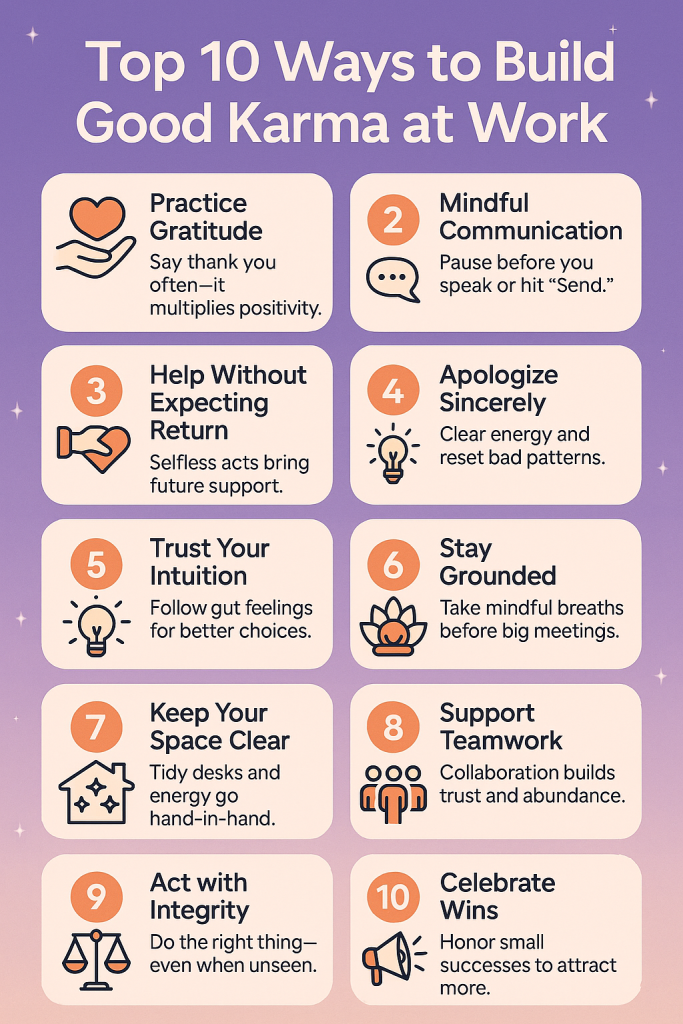Karma is often thought of as a cosmic scoreboard, keeping track of good and bad deeds. At work, though, karma feels less like a scoreboard and more like an energy exchange. The way you treat colleagues, the energy you bring into meetings, and the mindset you hold while working all ripple through your environment. When those ripples are positive, good things circle back.
Think of your workplace as a garden. Every word, gesture, or decision is a seed you plant. Some seeds bloom quickly into promotions or recognition. Others grow silently in the background, shaping how people perceive you and what opportunities flow your way. When you plant good energy, you harvest good karma.
But here’s where it gets even more interesting: psychic awareness can amplify how we navigate workplace karma. By noticing subtle energy shifts, trusting intuition, and practicing mindful actions, you can create a work environment that not only benefits your career but also supports your spiritual well-being.
What Karma Really Means in the Workplace
Karma is not about punishment or reward—it’s about energy returning in the same form you put out. At work, that means the tone of an email, the intent behind offering help, or even the thoughts you carry about coworkers all matter.
Psychics describe karma as the energetic imprint of actions. That imprint lingers in workplaces, affecting everything from communication flow to promotion opportunities. Sometimes, the ripple effect is subtle: a kind act today becomes unexpected support weeks later. Other times, it’s obvious: gossip spreads, and the instigator later finds themselves mistrusted.
Research supports this. A study on gratitude and well-being found that appreciation directly boosts mental health and workplace satisfaction (PMC). Gratitude is karmic energy in action—what you give out reflects back in improved morale and opportunities.
Signs of Good Karma in Your Career
So how do you know when you’ve built good karma at work? Here are some signals:
Colleagues offer help before you ask.
Opportunities appear at just the right time.
Your work feels fulfilling, not draining.
Team projects run smoothly with little conflict.
You notice synchronicities—like meeting the perfect mentor when you needed guidance.
Example 1: Nina, a marketing assistant, often went out of her way to help others with their presentations. Months later, when a manager role opened up, three coworkers independently recommended her. She hadn’t campaigned for the job—her karma did the campaigning for her.
There’s scientific backing, too. A review of workplace gratitude practices found that gratitude interventions improve job satisfaction, reduce stress, and even strengthen teamwork (PMC). Karma, it turns out, has measurable benefits.
Signs of Negative Karma at Work
On the flip side, workplace karma can sour. Negative karmic energy often shows up as:
Constant miscommunication and arguments.
Feeling drained after team interactions.
Repeated failures, like projects collapsing at the last minute.
Subtle exclusion from opportunities or recognition.
Example 2: Darren, a department manager, often belittled staff during meetings. For years, he seemed untouchable. But when a crisis hit and he needed extra effort from his team, no one stepped up. His years of negative energy had accumulated, and karma made sure the balance was restored.
Psychic Tools for Reading Workplace Energy
Psychic awareness can help you notice karmic dynamics before they become obvious.
Energy Scanning: Before a meeting, pause and “feel” the room’s atmosphere. Does it feel tense, warm, or neutral? Trust the first sensation.
Aura Awareness: Some psychics read the emotional aura of colleagues. While you may not see colors, you might sense heaviness, sharpness, or lightness around someone.
Meditation Before Work: A quick meditation clears your own energy so you don’t absorb negativity.
Example 3: A psychic reader once told a client that her constant exhaustion at work wasn’t from tasks but from absorbing her coworkers’ stress. By learning grounding techniques and shielding her energy, she regained vitality and even started enjoying her job again.
How to Build Good Karma at Work (Practical + Psychic Tips)

Good karma grows from consistent, intentional actions. Here’s how to cultivate it:
Compassion with Boundaries: Help colleagues, but avoid martyrdom. Overgiving can lead to resentment.
Act with Integrity: Even when no one is watching, choose honesty. Karma registers intent, not just visible behavior.
Visualization: Before work, visualize a bubble of golden light around you. Imagine it spreading positivity in every interaction.
Crystals for Energy Balance: Keep clear quartz or amethyst at your desk to absorb negativity and radiate clarity.
Example 4: Tanya, a project coordinator, kept a small piece of citrine near her laptop. She said it reminded her to stay positive. Coincidentally—or karmically—her team began complimenting her calm energy during stressful deadlines.
Everyday Practices for Positive Work Energy
Building karma isn’t about grand gestures—it’s about daily habits:
Mindful Communication: Pause before replying to emails. Does your tone match your intent?
Gratitude Rituals: End your workday by writing down three things you’re grateful for at work.
Balanced Energy Exchange: If a colleague covers for you, offer to return the favor. Reciprocity is karmic glue.
Even science agrees. Teamwork studies show that cooperation, communication, and trust directly enhance creativity and problem-solving (Scientific American). Karma builds cooperation—and cooperation builds success.
The Psychic Side of Career Success
Good karma and intuition often work hand in hand. You might feel drawn to apply for a job at the “right” moment or sense that a project will thrive before data confirms it. These gut instincts aren’t random—they’re your psychic senses aligning with karmic flow.
Psychics often encourage clients to trust these nudges. When paired with positive workplace karma, intuition becomes a compass pointing toward opportunities.
Breaking Cycles of Bad Karma at Work
Everyone makes mistakes. What matters is how you reset the energy.
Self-Reflection: Ask, “What patterns keep repeating at work?”
Making Amends: A sincere apology can clear karmic debt.
Energetic Reset: Meditate, set new intentions, or cleanse your workspace with sage.
By breaking cycles, you stop dragging old karmic baggage into new projects.
Cultural Perspectives on Work and Karma
Different cultures weave karma into work in unique ways:
Hinduism and Buddhism: Work done selflessly (karma yoga) accumulates positive karma.
Indigenous Traditions: Community contribution and reciprocity ensure harmony and prosperity.
Western Views: “Pay it forward” and servant leadership reflect karmic reciprocity.
Leaders who embrace servant leadership, focusing on service rather than authority, create workplaces rich with good karma (Harvard Business Review).
Why Good Karma Is Good Business
Karma isn’t just a personal benefit—it’s a business advantage. Teams with positive energy are more creative, productive, and resilient. When trust and gratitude circulate, employees support each other through challenges.
But cooperation isn’t always easy. Workplace dynamics can block it. Anthropological research asks why cooperation often falters despite its benefits (Scientific American). Karma helps unblock these patterns by encouraging mindful, respectful behavior.
Conclusion: Your Job as a Spiritual Classroom
Your workplace is more than a paycheck generator—it’s a spiritual classroom where karma is constantly in motion. Every choice, from how you handle stress to how you treat colleagues, shapes the energy that returns to you.
Good karma isn’t about perfection. It’s about awareness, compassion, and alignment with your higher purpose. Add a touch of psychic intuition, and you’ll find your career unfolding with more flow, opportunities, and satisfaction.
So tomorrow, when you log in or walk through the office doors, remember: you’re planting seeds. What you grow is up to you.
FAQ: Karma in the Workplace
What does good karma at work mean?
It means creating positive energy through actions, words, and attitudes that bring supportive relationships and opportunities.How can I build good karma in my job?
By practicing kindness, integrity, gratitude, and mindful communication with colleagues every day.What are signs of good karma in the workplace?
Helpful colleagues, smooth teamwork, synchronicities, and feeling fulfilled in your role are strong indicators.Can karma affect career growth?
Yes, positive karma often attracts promotions, recognition, and supportive mentors.What are signs of bad karma at work?
Constant conflict, lack of recognition, repeated failures, or feeling drained after interactions.How can I clear negative karma at my job?
Reflect on patterns, apologize when necessary, and set new intentions for positive energy.Can psychic awareness improve workplace karma?
Yes, intuition helps you sense energy shifts, avoid conflicts, and act with higher awareness.How can gratitude practices improve workplace karma?
Expressing genuine appreciation builds trust, enhances collaboration, and fosters positive karmic flow.Do crystals help with workplace karma?
Crystals like citrine or clear quartz can support positive energy and mindfulness at your desk.Can meditation create good karma at work?
Meditation clears stress, centers energy, and helps you respond positively in challenging moments.How does servant leadership connect to karma?
Serving others creates cycles of trust and respect, generating positive organizational karma.Are teamwork and karma related?
Yes, teams with cooperative energy tend to achieve better outcomes and stronger relationships.What role does forgiveness play in workplace karma?
Forgiveness releases negative energy, resets karmic cycles, and builds healthier work environments.How can intuition guide career decisions?
Your gut feelings can reveal when opportunities align with your energy and long-term purpose.What is karmic debt in a workplace context?
It refers to unresolved patterns of negativity that repeat until addressed or corrected.How do cultural views of karma apply to modern jobs?
Many traditions emphasize reciprocity, integrity, and service—values that enhance career success today.Can synchronicities at work signal good karma?
Yes, chance encounters or “lucky breaks” often reflect positive karmic alignment.Does gossip create bad karma at work?
Yes, negative talk spreads harmful energy and often circles back as mistrust or exclusion.How can I attract abundance with good karma at work?
By aligning your actions with gratitude, service, and fairness, abundance flows naturally.Can workplace gratitude reduce stress?
Yes, gratitude interventions have been shown to lower stress and improve well-being.How can I use visualization to build karma at work?
Visualize positive interactions, successful projects, and cooperative energy before meetings.Does helping coworkers without expecting return build karma?
Yes, selfless acts often lead to unexpected support later.Can negative workplace karma affect health?
Toxic environments can drain energy and contribute to stress-related health issues.How does mindfulness improve workplace karma?
Mindfulness helps you respond instead of react, preventing negative karmic cycles.Can small actions create big karmic shifts?
Absolutely—simple gestures like kindness or listening can ripple into lasting positive effects.What is karmic alignment in career paths?
It means choosing roles and opportunities that resonate with your values and purpose.Can apologizing reset workplace karma?
Yes, sincere apologies can dissolve negative energy and rebuild trust.How does cooperation relate to karmic flow?
Cooperation balances give-and-take energy, creating harmony and productivity.Can psychic readings reveal workplace karma?
Yes, psychics often identify repeating patterns and offer guidance for energy shifts.Is everyone capable of building good karma at work?
Yes, every employee can cultivate good karma through awareness, kindness, and integrity.





The article highlights fundamental yet often overlooked aspects of professional etiquette. Being kind, positive, and helpful are key to creating a supportive work atmosphere. However, the real-world application may vary as it requires a collective effort from all team members.
The notion of positive karma impacting career success is intriguing. Yet, it would be beneficial to see more empirical evidence supporting these claims. The advice is sound, but validation through case studies or research would strengthen the argument.
The concept of mentorship and celebrating successes are well-illustrated strategies for improving workplace dynamics. These not only enhance individual morale but also contribute to a cohesive team environment. It would be interesting to see how these practices are adapted in different industries.
This article beautifully encapsulates the essence of maintaining a positive demeanor in a professional setting. The emphasis on creating good karma through kindness, honesty, and compassion is truly commendable. It resonates deeply with the principles of emotional intelligence and ethical conduct. By fostering an environment of support and mutual respect, we not only elevate our own professional journey but also contribute to a more harmonious workplace. Kudos to the author for such an insightful piece!
The article provides practical advice on how to foster a positive work environment. The point about avoiding gossip is particularly important as it can significantly affect workplace morale. Still, the effectiveness of these suggestions would depend on the broader organizational culture.
The emphasis on creating positive karma in the workplace is certainly noteworthy. It aligns well with the principle of reciprocity where positive actions often lead to favorable outcomes. However, implementing these practices consistently could be challenging given the complexities of human interactions.
Comments are closed.